Graham Reid | | 9 min read
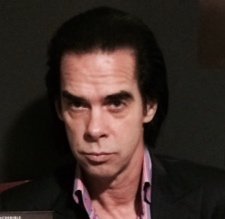
The backstage room at Auckland's SkyTower Theatre where Nick Cave waits is tiny, but doubtless he's seen much worse.
He's arrived with no fanfare, greets my wife Megan and me warmly in the nearby green room . . . and in 15 minutes will walk out onto the nearby stage and field questions about the sort-of-documentary film 20,000 Days on Earth which is just coming to an end before a capacity audience.
He's wearing a pin-stripe suit worth more than my car, a beautiful shirt and polished winkle-picker boots. He looks every inch the image of Nick Cave as you would want him, and is affable, witty and accommodating.
Later tonight he will take the stage at the majestic Civic down the road for a sell-out show, but right now all he wants is a banana.
“It's a sugar thing,” he laughs.
If there was a rider for this speaking engagement – and the running schedule for the afternoon says there was – then it is extremely modest: a couple of bags of potato chips, some bottled water and a pot of hot water with which he makes himself tea in a glass; tea bag and milk, no sugar.
I'm here because I have been invited to introduce the film which is coming on DVD/Blu-Ray in a few days, and then after the screening to introduce Nick.
Beforehand I've already told the audience it would be appreciated if they could actually formulate questions rather than simply making some statement or tell a personal anecdote. Many people laugh.
As Nick and I wait we exchange easy pleasantries, I confirm what he wants me to do – it's easy, he'll just do the Q&A by himself but I'm to be positioned to give him a wind-up indication after 40 minutes – and then we chat about the film and sessions such as this.
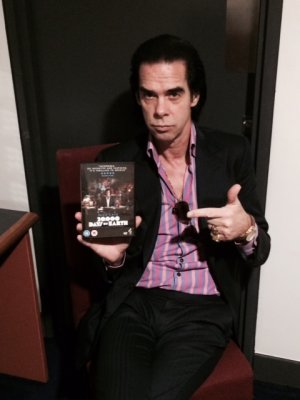
The questions don't dry up though, he laughs.
His bananas arrive.
“Go one have one, you know you want to.”
Given the film – a fictional portrayal of what seems to be a very long day or two in his life – is coming out on DVD I ask if it wouldn't be a breach of protocol to get a photo of him posing with the copy I've brought.
No problem, he shuts the bathroom door and I snap off a couple of pix. Done.
I ask about how fictional the film is – the DVD extras reveal a significant portion is, and it isn't a documentary – and specifically about his “office” that we see. The extra features suggest it isn't his actual office.
“Well, yeah it is. But we had to take most of the pictures and things off the walls because of copyright. Costs a fortune to get the rights to use them.”
So “the office” – as is much of the film – is a construct for dramatic purposes.
The film is almost over now so I leave him to his banana, tea and a packet of three combs which have been left and rather amuses him.
I wait in the wings as the credits roll and he comes down the stairs. I suggest we fade down the sound as the credits are long.
“Yeah, really long,” he laughs and – just as I am about to walk on stage with a live mike – he gives me a mischievous grin and says, sotto voce, “Just don't call them a pack of cunts”.
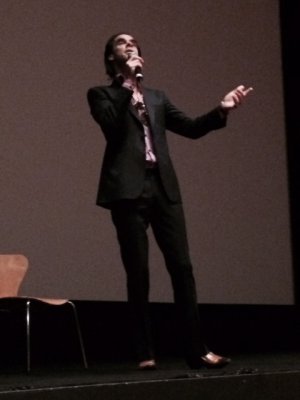
Nick comes on to rousing applause, walking like a slightly drunken gazelle.
He is immediately charming and open to anything.
He opens by answering a question about the filmmakers Iain Forsyth and Jane Pollard being good because they made the people in “look better than they are”.
There is immediate laughter and the mood is lightened. From where I am seated I can see faces beaming, a kind of love and respect radiating towards the gangly figure on the stage with a hand-held mike.
He tells a funny story about his first meeting with former Bad Seed Blixa Bargeld who would only speak German to him (“and I didn't speak German”) but then eventually spoke in perfect English.
Someone ask when was the last time he saw the late Birthday Party member Roland S Howard: “We had lunch together in Fitzroy St in St Kilda. Mick Warren and I ran into him, we talked about stuff . . . and then he borrowed $50!”
He reveals his favourite Kylie Minogue song (“Better the Devil You Know, it's a fucking dark song basically saying it doesn't matter baby that you been fucking abusing me I'm coming back . . . for more”), makes some risque jokes, is utterly endearing and candid (within reason), answers good questions at length and is wittingly monosyllabic with others.
There's a farcical quality about the random nature of questions in a format such as this.
People want things autographed so carry albums and CDs to the stage which he signs, he gets his photo taken with a couple of people.
There is someone who asks why he is so beautiful, but they seem to be off their meds and keep shouting while he wants to move on (“You look after yourself” he says), but the inane comments keep coming: “I'm 50”.
Nick says, “Thank you very much, now sit down and shut up”.
When they persist – “I'm from Swanson” – security moves in, but Nick reassures the person they don't have to remove him.
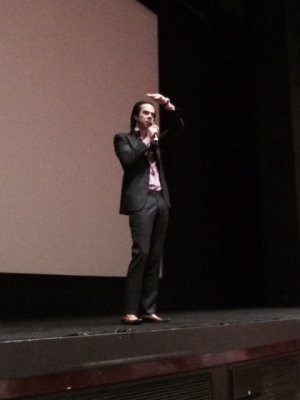
This is greeted with loud approval and the questions begin again.
He's asked about his own favourite song and album (what can he say, you can't choose between children and of course his favourite album is “the last one, I think we finally got somewhere”), he talks about the difficulty of work/life balance, a photographer wants to know if he'll ever live in Australia again (“Probably not”) and wants give him her card.
He speaks of dispensing with his past in the opening minute of the film where we see a barrage of chronological images of (sometimes) his life to that point of the theatrical construct of his 20,000 day on Earth: “It is a filmic version of the same kind of editorial story that I've read many times about myself which has 'grew up in Wangaratta', a basic trajectory. It's not particularly true, but if you Google it that's what journalists find.
“But I had no interest in putting out this story again, so I thought we could do that story in 50 second at the start then relax and talk about different sorts of things.
“I loved the way they did that.”
He tells a good story about the first time he heard Leonard Cohen and what a profound experience it was.
He says he finds music documentaries tedious and what he just wanted to make was a film that wasn't boring. His answer to this question is especially telling.
“These [music] documentaries seem to try to demystify these people you've loved and revered. So you get to see Leonard Cohen putting out the garbage or doing the dishes . . . and this is somehow supposed to make us feel he is human, just like us.
“We wanted to put forward the idea that actually the person who is in the public eye a lot – and that gets worse and worse the more they are in the public eye – aren't really human beings in that same way. They are affected deeply by the collective gaze of their audience, and it changes the way that they are.
“And the idea of them being able to act in a normal way is actually not true.
“In as much as these people would like to put forward that it is true. Like Bruce Springsteen is a good old guy who fixes his car on the weekend and drinks with the people from the steelmill. It's not true.
“They are deeply affected by the process of being celebrities and it changes them completely. We wanted to put forward that idea. So a lot of people are confused by the film, what is real and what is not real.
“On some level none of it real. I hate to tell you but Warren [Ellis] does not live in this little house on the cliff, and he doesn't cook eel.”
People laugh but there is almost a palpable sense of disappointment that they have been seduced by the film's artifice.
“I know, it's sad. But with these constructs there is a lot of truth told. Because there's a lot of truth about Warren in that scene even though it's constructed. The Warren that is in the public eye a lot can act more naturally in a contrived scene than he can outside of it.
“So a lot of truth got told within the lies.”
There's a question about getting older and facing mortality, how might that change what he writes about.
“I might start writing songs about death.”
After 40 minutes I give him the call-up, he answers a couple more questions and then leaves to huge applause.
We walk to lift. He just about knocks his head against a low pipe.
Given he has signed so much stuff (“that's a bootleg,” he'd said about one album he signed on stage) I ask if he would sign the DVD cover for my wife's brother-in-law. He does so as we walk, and then signs my copy of Bleddyn Butcher's photo collection A Little History; Nick Cave and Cohorts 1983-2013.
“Do you know Bleddyn?” he asks as he writes: “To Graham with love and thanks, Nick Cave”.
I ask if this was an odd session or was it fairly typical, because I was surprised there were so few questions about the construction of the film.
“Yep, pretty typical.”
But he's forgiving, the audience has just watched a whole film about him and they can't get their heads around that.
He wants to know where to eat after the show, seems keen to find a place within walking distance of his hotel.
On the way down through the lobby of the SkyTower I ask what he does in the five minutes before going on stage to prepare.
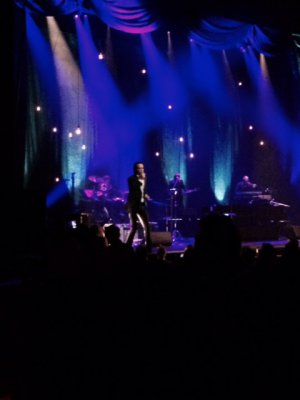
He gives me a warm handshake and gentle hug, kisses Megan on the cheek and disappears into the taxi.
It's another six hours before I see him again, when he steps out under the lights at the Civic.
It is an excellent, but not exceptional, show which runs to the two-hour mark, and even though he has a band with him it is very much Nick at the centre. Multi-instrumentalist Warren Ellis remains seated the whole time and keyboard player Barry Adamson is a quiet presence.
His once fiery and furious songs – Red Right Hand and Up Jumped the Devil – seem more formulaic than his quieter songs at piano such as Love Letter and Let Love In.
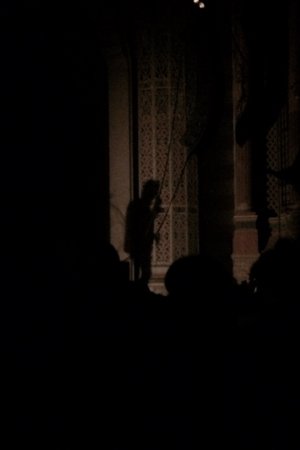
Cave comments that he's “a front row guy” and he is.
He works the up-close audience whose hands reach out to him as if in some secular Baptist revival show.
And as his lyrics unfurl you can hear how he references other literary and musical forms: Gwendolyn Brooks' 1963 poem We Real Cool in the quiet opener of the same name; the pop hit Green Green Grass of Home in Sad Waters; Robert Johnson and the crossroad story; full phrases lifted from the Bible and mythology . . .
It is an extraordinary accomplishment to weave these into his own oeuvre an make them new.
And as he moves across the stage he also presents a programme that engages the capacity audience in stately and sometimes improbably slow songs.
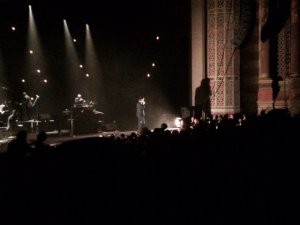
On the way out I comment to a friend that these days the elegantly dressed, affable and myth-breaking Nick Cave is more New Testament than Old.
But as that fascinating 20,000 Days on Earth proves . . . the mystique remains.
Everything, and nothing, is revealed.
The DVD/BluRay of 20,000 Days on Earth (Madman) is available December 11
There is much more on Nick Cave at Elsewhere starting here, including an archival interview from 1992.


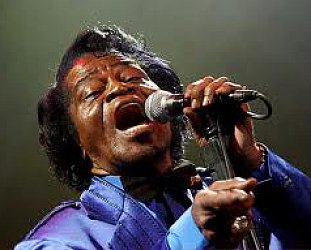
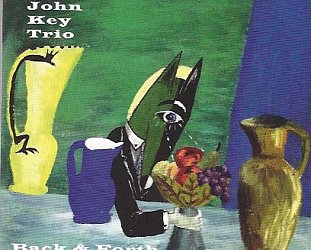
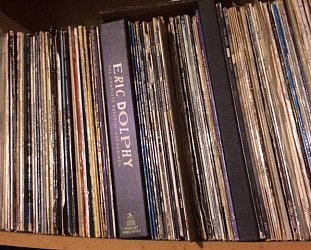
Geoff Lealand - Dec 7, 2014
Thanks for this, Graham. Some consolation for not getting tickets to the concert, despite begging and pleading.
Savepost a comment